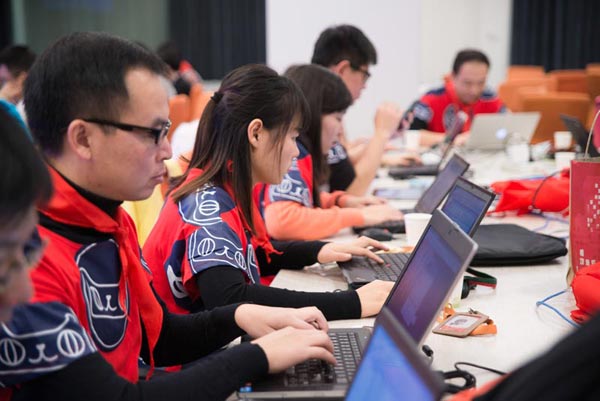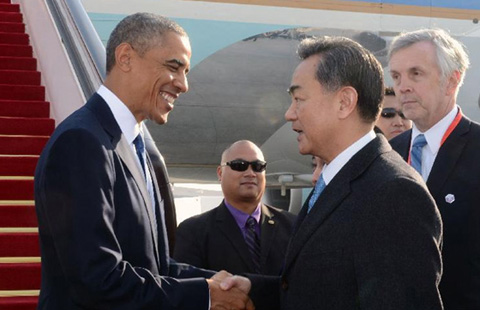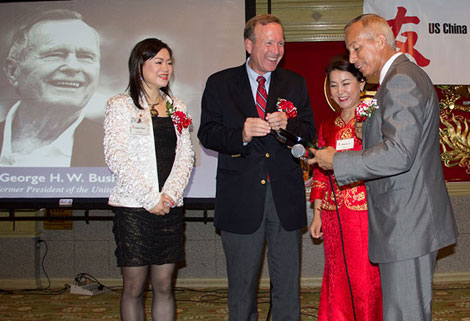New '11.11' sales record for Alibaba
Updated: 2014-11-11 06:35
By MENG JING in Beijing and AMY HE in New York(China Daily USA)
|
||||||||
 |
|
Alibaba staffers process orders for the e-commerce giant's "11/11" online shopping spree in Hangzhou on Tuesday. Within the first 40 minutes of the largest one-day online shopping event in China – and maybe the world – sales broke a record when they exceeded 10 billion yuan ($1.6 billion). [Photo provided to chinadaily.com.cn] |
Another year, another "11.11" record in China for e-commerce giant Alibaba.
Online sales hit 10 billion yuan ($1.6 billion) within 40 minutes after the start of its 11.11 online shopping spree on Tuesday, shortly after midnight China time.
The Hangzhou-based company upgraded this year's event into a global online shopping carnival by helping Chinese shoppers purchase overseas products and overseas buyers acquire goods from China.
Shoppers from 175 countries placed orders on Alibaba's platforms within the first 40 minutes of the largest online shopping event in China, which falls on Nov 11.
Created on November 11, 2009, by Alibaba, 11.11, or "Singles' Day", has become China's largest online shopping day. The event was originally launched to tempt single people without partners to console themselves with some retail therapy, spurred on by massive discounts from retailers, similar to what Black Friday shopping events are to customers in the US, which falls on the day after Thanksgiving in November.
Last year, Alibaba, which had a record breaking IPO in the US in September, rang up total sales of more than 35 billion yuan ($5.7 billion) with the event's 24 hour duration. About 13.7 million shoppers visited Alibaba's business-to-customer platform Tmall in the first minute of last year's Nov 11 shopping festival. Transactions in the first minute totaled 117 million yuan ($19 billion).
Alibaba refused to reveal the sales target for this year's event, but analysts said that the number is expected to be much bigger than last year because shoppers from more countries are involved.
"As China's e-commerce market becomes more matured, online platforms can't rely on Chinese consumers spending more and more each year on the same products. They need to expand their product range, which will increase the average purchase value in China, and they need to expand their customer base," said Neil Flynn, head equity analyst at Shanghai-based Chineseinvestors.com, a leading financial analysis firm of US-listed Chinese companies.
Michael Zakkour, China practice leader for consulting firm Tompkins International, said that "Singles' Day makes clear that e-commerce, digital marketing and social media are three key ingredients for local and foreign brands seeking to engage and create relationships with Chinese consumers."
Expecting a strong performance from its Nov 11 shopping festival, Alibaba's share price on the New York Stock Exchange jumped to $119. 35 on Monday from $114.5 on Nov 7. In terms of market value, Alibaba is the world's seventh-largest company, overtaking General Electric Co and Wal-Mart Stores Inc, and trailing only Microsoft Corp, Apple Inc and Google Inc of the tech giants.
A survey conducted by the China research arm of the Financial Times with 2,000 Chinese consumers found that in addition to Alibaba's Tmall, the most popular online shopping portals are Alibaba's Taobao, which offers an eBay and Amazon-like shopping experience, Amazon China, JD.com and Dangdang.
Many customers purchased more cosmetics on Tmall than they did in brick-and-mortar retailers, and those who visit brick-and-mortar stores for general shopping did so to check products out in person before purchasing them online, the survey found.
"Alibaba's two platforms Taobao Marketplace and Tmall continue to dominate the Chinese online market," said China Confidential, the firm. "A combined 89.3 percent of respondents said they most regularly visit Taobao Marketplace and Tmall," which is up 7 percent from the same period last year, it said. The company conducted surveys with 1,960 urban online shoppers in late September.
Suning Commerce Group, one of the largest privately owned retail groups in China, launched a new website on Nov 11 to coincide with Singles' Day. Like Alibaba's platforms, the site gives Chinese customers in China access to US brands and goods.
In addition, the new website (http://www.haigo.us/) will also offer Chinese living overseas a place to purchase Chinese products from back home, the company told China Daily.
Lian Zi contributed to this story.
Contact the writers at mengjing@chinadaily.com.cn and amyhe@chinadailyusa.com.
- Li's Myanmar tour to open new chapter in China-ASEAN ties
- Li suggests greater China-Chile trade cooperation
- President Xi lends support for HK
- China plans to launch about 120 applied satellites
- Tiny apartment near desirable school fetches huge price
- Xi calls for mutual trust, respect across Taiwan Straits

 Peaking for APEC
Peaking for APEC
 Scenery near Yanqi Lake in Beijing
Scenery near Yanqi Lake in Beijing
 Germany celebrates 25th anniversary of fall of Berlin Wall
Germany celebrates 25th anniversary of fall of Berlin Wall
 Obama arrives in Beijing for APEC meeting, state visit
Obama arrives in Beijing for APEC meeting, state visit
 'Friendship mode' key in China relations
'Friendship mode' key in China relations
 Herdsmen of Tajik ethnic group play traditional game
Herdsmen of Tajik ethnic group play traditional game
 Singles' Day sales that reveals a lot
Singles' Day sales that reveals a lot
 Scenery of APEC venue Yanqi Lake in Huairou District
Scenery of APEC venue Yanqi Lake in Huairou District
Most Viewed
Editor's Picks

|

|

|

|

|

|
Today's Top News
New '11.11' sales record for Alibaba
Master chef dishes up secrets of Western cuisine
Rick Snyder seeks to woo China trade and giant pandas
Shanghai-HK stock connect starts on Nov 17
Alibaba’s '11/11' opening sales break record
Hershey hits sweet spot in China market
Rape of Nanking author recalled at service
What's in a name? A free trip around globe
US Weekly

|

|








